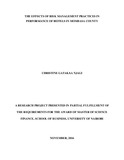| dc.contributor.author | Njagi, Christine G. | |
| dc.date.accessioned | 2016-11-14T12:34:24Z | |
| dc.date.available | 2016-11-14T12:34:24Z | |
| dc.date.issued | 2016-11 | |
| dc.identifier.uri | http://hdl.handle.net/11295/97143 | |
| dc.description.abstract | Risk Management helps ensure effective reporting and compliance with laws and regulations, and helps avoid damage to the entity‟s reputation and associated consequences. Effective risk management plays an important role in daily operations of business entities to avoid financial insolvency and bankruptcy. Hospitality industry in Kenya has had difficult times over the years, particularly prolonged period of lackluster performance in the 1990s, a post-election period of civil unrest in 2008 and the global economic crisis in 2008 and threat of terrorism in which Kenya has lost both its citizens and the tourists to the Al-Shahab from Somalia. This has brought down the tourism sector in Kenya to its lowest point ever. The purpose of the study was to evaluate the effect of the risk management practices on the performance of hotels in Mombasa. Descriptive survey design was adopted. The target population was 3, 4 and5 star hotels in Mombasa County. Middle and top managers were the respondents in the study. Stratified random sampling was used to arrive at a sample of 13 hotels where from each hotel 2 respondents were selected to give the study a sample of 26 participants. Data was collected using self-administered questionnaires. Descriptive statistics were used to organize the findings while correlation analysis was used to determine the magnitude and direction of the relationship between risk management practices and performance of hotels. The study found that Majority (56%) of respondents indicated that their hotel did not have a risk management policy. Majority (66%) of respondents indicated that the risk management policy was reviewed after several years while for 30% it had never been reviewed. Majority (60%) of the respondents in the study indicated that their hotel did not have a risk management department. Majority (65%) of respondents indicated that their hotel used risk avoidance as a risk management technique. 43% indicted cost of the risk control method while 23% indicated statutory requirements as the factors considered when selecting the risk control methods to be used in their hotel. The study concludes that risk management practices have a relationship with performance of hotels. Specifically, proper risk management practices enhance performance of hotels. The study concludes that hotels in Mombasa have poor risk management practices. The study recommends that all hotels should have a risk management policy and employees should be involved from the start in the planning and implementation. The study also recommended that the government through its concerned agencies should enforce statutory requirements of risks management to enhance compliance with risk management. | en_US |
| dc.language.iso | en | en_US |
| dc.publisher | University of Nairobi | en_US |
| dc.rights | Attribution-NonCommercial-NoDerivs 3.0 United States | * |
| dc.rights.uri | http://creativecommons.org/licenses/by-nc-nd/3.0/us/ | * |
| dc.title | The Effects of Risk Management Practices in Performance of Hotels in Mombasa County | en_US |
| dc.type | Thesis | en_US |



